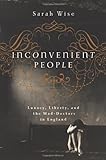
Mania
Gaslight Stories: The Mania for Monomania
Victorian definitions of insanity were every bit as slippery as ours are today
Posted April 30, 2013
‘The melancholy fact is that your thorough-going mad-doctor takes it for granted that hardly anyone is sane.’ Overlook the archaisms ‘thorough-going’, ‘melancholy’ and ‘mad-doctor’, and you’ve pretty much got the gist of much of the journalistic scorn that will doubtless shortly greet the fifth edition of The Diagnostic and Statistical Manual of Mental Disorders (DSM).
In fact, the quotation is from the London Times newspaper of 28 December 1829, and is taken from an editorial on the case of young Edward Davies – certified into a private asylum by his greedy mother, who wished to gain control of his flourishing business. Mom had found two illustrious physicians, plus an equally renowned asylum proprietor, who were convinced (or who had managed to convince themselves) that Edward was suffering from the achingly fashionable condition ‘monomania’. Problem? Edward had always exhibited the unusual traits that were now being worked up into a tale of insanity. He hadn’t changed at all: so why was he suddenly being declared ‘of unsound mind’? Could it have been anything to do with his intention to make his first will, and to find himself a wife? The British public and the newspapers believed that indeed it was – and a near riot ensued at the realisation that a freeborn Briton could be so hideously mis-labelled.
Monomania had its origins in the work of Jean-Etienne Esquirol (1770-1840) at Parisian asylums in the 1790s – a fancy French origin that meant that it would often face hostility from the more pragmatic, less theoretical Britons. Monomania was a ‘partial insanity’, which left most of the intellect undamaged – with mental ‘disease’ affecting only one aspect of the mind. Edward Davies’s nay-sayers claimed that monomania was the reason why he could continue running his hugely successful tea company from his tiny room in the asylum: his analytical skills and intelligence were unaffected, they said, but his behaviour (stuttering, boasting, constant use of irony, over-dramatic gestures and a declamatory voice) meant that he was a candidate for incarceration.
Monomania, though, was too nebulous a notion for many – certainly for the jury at the Davies lunacy hearing, who restored Edward to freedom and to his good name. The word the jury foreman used to describe monomania was ‘Nonsense’.
The monomania debate was just one of many in the vast battleground of 19th-century classificatory systems. The 20th and 21st centuries have come to view the Victorian practitioners of mental medicine as horribly overconfident in their diagnoses and in their willingness to ‘put away’ any number of misfits and eccentrics. In fact, Victorian psychiatry (or ‘alienism’, to give it its correct name) was a seething mass of contested terminologies. As Professor Rick Rylance, historian of the period’s literature, has put it: ‘Nineteenth-century psychology seems to me a mosaic always in process of completion, in which each of its many makers had a different vision of the pattern, and rarely co-operated.’
Plus ça change: the controversies that arise with each new version of the DSM are so deep-rooted in the history of psychiatry that perhaps we should now consider them as traditional as Thanksgiving turkey and the summer maypole.
References: Rylance, Rick (2000). Victorian Psychology and British Culture, 1850 1880. Oxford: Oxford University Press
 Inconvenient People: Lunacy, Liberty, and the Mad-Doctors in Englandby Sarah Wise
Inconvenient People: Lunacy, Liberty, and the Mad-Doctors in Englandby Sarah Wise
Counterpoint

